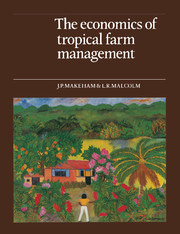Book contents
- Frontmatter
- Contents
- Preface
- Acknowledgements
- 1 Introduction
- 2 Farm management
- 3 Farm analysis and planning
- 4 Principles of production
- 5 Costs and returns
- 6 Farm profits, financial statements and records
- 7 Cash flows
- 8 Gross margins
- 9 Time is money
- 10 Planning changes
- 11 Cropping
- 12 Animals
- 13 Mechanisation
- 14 Farm development
- 15 Farm credit and finance
- 16 Beyond the farm
- Appendix 1 Interest rate tables
- Appendix 2 Metric conversion
- Glossary
- Index
7 - Cash flows
Published online by Cambridge University Press: 12 October 2018
- Frontmatter
- Contents
- Preface
- Acknowledgements
- 1 Introduction
- 2 Farm management
- 3 Farm analysis and planning
- 4 Principles of production
- 5 Costs and returns
- 6 Farm profits, financial statements and records
- 7 Cash flows
- 8 Gross margins
- 9 Time is money
- 10 Planning changes
- 11 Cropping
- 12 Animals
- 13 Mechanisation
- 14 Farm development
- 15 Farm credit and finance
- 16 Beyond the farm
- Appendix 1 Interest rate tables
- Appendix 2 Metric conversion
- Glossary
- Index
Summary
Introduction
The annual net cash flow (or net receipt) of money interests most farmers. For the semi-subsistence farmer, a budget also has to be drawn up showing the ‘net food flow', i.e. the expected supply and demand for food, before the cash flow budget can be constructed. Both budgets can stimulate and assist farmers and their advisers to make plans.
The cash flow is found simply by subtracting the money spent over the whole year from the money received. Farm advisers often find it useful to calculate cash flows on a monthly or quarterly basis to help their farmer clients. These are especially useful for shortterm crops. They may do this when they are budgeting next year's programme, or when comparing this year's actual results, with the expected results set out in the budget which they prepared before the start of the year. When a farmer is planning either next year's programme, or a longer-term project which may involve investing borrowed capital, he wants to know certain things from his adviser.
(i) How much money or food the programme is likely to produce and how much the programme will cost?
(ii) When will he receive the money or the food, and importantly, when will he need money or food?
(iii) If the amount of money or food he expects to receive during a given period does not cover the amount he will need, how can he make up the difference? Will the bank provide a loan? Does the farmer have savings, or any stored reserves of food?
(iv) How much money will he be able to save in say, I, 2 or 3 years’ time if he undertakes this programme?
Cash flow budgets are important in:
planning farm development projects;
arranging loans;
preparing to cope with cash ‘crises';
choosing between alternative farm plans;
comparing actual against budgeted results, so enabling corrective action to be taken on time..
Cash Flow Budgets
These are designed for the farm adviser to assist the farmer in planning his future activities, either on a short-term (monthly, quarterly or year-long) or a medium-term (4–5 year) basis. Cash flow budgets are also used to provide continuous feedback or monitoring during the period of the programme. The adviser will be able to compare the actual cash income and costs with the estimates made when the adviser drew up the budget.
- Type
- Chapter
- Information
- The Economics of Tropical Farm Management , pp. 56 - 60Publisher: Cambridge University PressPrint publication year: 1985



